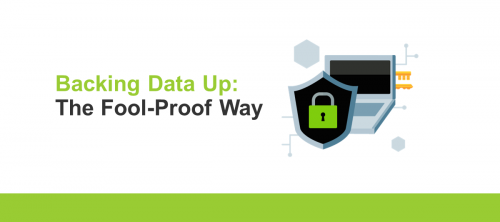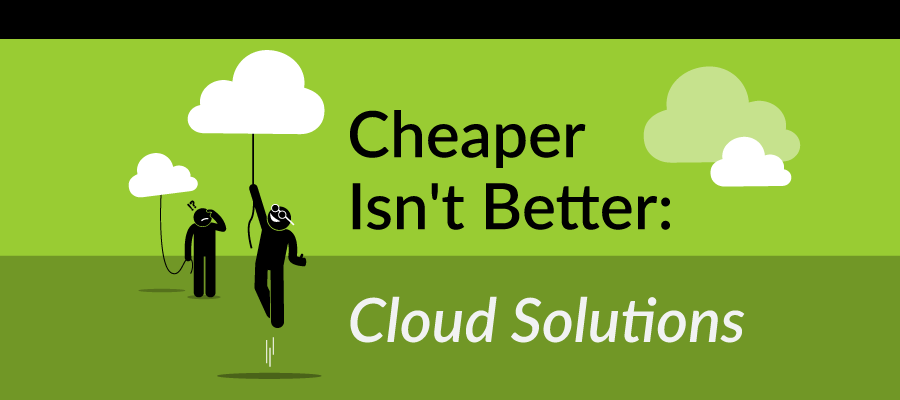Data backup can save a business from certain disaster. And yet, 60% of businesses have experienced a loss or theft of sensitive data in the past 12 months. So why do so many businesses lack a data backup strategy?
There are three common reasons why so many businesses lack data backup procedures:
- They’re unsure where to start
- There’s a misguided understanding of risk vs. cost
- They don’t have time for a new project
Data backup is important, attainable and easier than you think. Let’s address each of those concerns.
Quick Navigation
What is Data Backup?
Data backup is the process of protecting business information from risk. These risks can range from physical (think fire, flood, hurricane) to digital (hacking, employee error, technical failures).
Data backup involves three important things: information, frequency, and speed:
- Information: What data needs to be backed up?
- Frequency: how often will you back up your data — hourly, daily, weekly?
- Speed: How quickly does your data need to be retrieved pending issues or emergencies?
Where is Data Backed Up?
Once you’ve determined these three things, it’s time to see which backup method is best for your company. From internal hard drives to removable storage and the cloud, what matters most is “redundancy.”
Redundancy is the method of having duplicated information.
It ensures you have a backup to your backup. We suggest to our clients they back up files locally (meaning onsite) as well as offsite in a separate disconnected location. This way, if your local backups are destroyed by flood or held ransom by hackers, you don’t have to worry — your offsite backups are ready to go.
Take these two examples.
Business 1
Business 1 understands the value of backing up data. They’ve done their homework and determined the best way to back up their data is on a local server and the cloud. Hackers breach Business 1’s network, locking their files and demanding a $2,000 ransom.
Because of redundancy, Business 1 isn’t held hostage by the hackers. They can access their files from the cloud and continue working while the ransom mess is dealt with accordingly.
Business 2
Business 2 decided to take the risk and not back up their data. Like Business 1, hackers breached their network, locking their files and demanding a $2,000 ransom.
Business 2 has no choice but to give into the hackers’ demands to get their data back. Not only will Business 2 have to pay the ransom, but they’ve also lost time as well as trust when consumers find out what happened.
Why Is Data Backup Important?
Every business knows data backup is important. But “important” is subjective. Is it important enough to spend time on? This is what we mean by misguided understanding of risk vs. cost.
We often hear businesses say, “What’s the risk of losing my data versus the cost it will take to back it up?” Many of those businesses have been hedging their bets on not losing data.
Our response is, “Would you also risk leaving your office, house and car without locking up?” That’s a risk too.
Backing up your data protects your company. It minimizes the risk your business is responsible for, including data breaches, data loss and data stealing.
With the right network backup solutions, businesses see:
- Improved company trust with customers.
- Decreased lost time and money due to unexpected issues.
- Support for scalability and future planning opportunities.
- Greater employee flexibility and mobility.
Backup Procedures Improve Trust
People buy things because they trust the product or service. If your business loses that trust, it loses customers too. With proper backups, your business operations can continue if something happens to your data. You can minimize or eliminate halts in product/service delivery, keeping that customer trust intact.
Backup Strategies Minimize Unforeseen Costs
If your employees can’t access the files necessary to work, your business is effectively shut down. That downtime can cost you from $10,000 all the way to $5 million. Not only will you lose money, but you’ll lose critical time as employees attempt to catch up on responsibilities.
The worst-case scenario would be hackers. With a security breach, hackers can take control of your data and hold it for ransom. The cost to get your data back could be enormous. With data backups, you can avoid such problems.
Data Backup Promotes Business Growth
Your IT environment can affect the growth of your business. You have to account for computer space, server room and more, along with the other needs of your business. With cloud storage, you can minimize the IT-related space your office needs. By storing your data remotely your business can grow with less to worry about.
Data Backup Solutions Allow Employee Flexibility
Think about how your business operates. Are employees on the go? Do you plan to hire remote workers? With the cloud, your team can access files from anywhere as long as they have an internet connection. This means greater work-life balance for your employees, improving job satisfaction and productivity.
Anything can happen. Without proper backups, your data could be lost forever. Backups are a fail-safe for life’s unknowns, allowing your company to continue with confidence.
What Happens When Data Isn’t Backed Up?
In one word: loss. Here are some things that can happen:
- Irreversible data loss resulting in lost personal private information and important company documents.
- Paying potentially thousands of dollars to hackers holding your data ransom.
- Temporary business shutdown resulting in lost consumer confidence and cash flow.
- Legal action and fines taken due to breaking industry, federal and state compliance regulations.
- Wasted time rebuilding what was lost, taking employees away from their job responsibilities.
What Are My Data Backup Options?
Let’s talk about different strategies. First, let’s make sure we know some basic terminology of data backups. Make sure to ask questions about these when you talk to any data backup provider.
- Onsite backup: When data is stored locally. For example a hard drive, USB stick or disk.
- Offsite backup: When data is stored at a different location on a remote server. Think cloud-based backups like Dropbox or AWS.
- RTO (Recovery Time Objective): the accepted length of time to recover data to avoid business continuity problems. “How quickly do we need the backups before it causes problems for business?”
- RPO (Recovery Point Objective): the accepted amount of time between data backups that won’t cause business continuity problems. “How often do we need data backed up to avoid problems for business?”
- Redundancy: the method of having duplicated information. It ensures we have a backup to our backup.
- Restoration: the process of bringing back data that was lost.
- Retention time: the amount of time a backup will remain available for restoration.
Now, let’s talk about your options. There are three types of data backups: hardware, software and cloud. There are pros and cons to each. To make the best decision, talk to a local IT company who can give you an outsider perspective.
Hardware Backups
Everyone is familiar with hardware backups. They’re physical devices like USBs, disks and tapes.
- Pros: relatively affordable, easy to install
- Cons: requires constant manual labor, limited file space, won’t survive fires or flooding
Software Backups
The next type of backups is software-based. Software backups store data separately from your hard drive. Examples include Acronis True Image and NovaBackup.
- Pros: flexibility, variety of options
- Cons: requires installation on all computers, may require extra purchases
Cloud Backups
Cloud is the future of data backups, but it’s also the most misunderstood. Rather than using the storage space on your computer, files are put on virtual servers that connect to data centers.
There are two methods to cloud data backups. Through public cloud or privately-held ones.
You’re probably familiar with public clouds like Dropbox and Microsoft Azure. These options are readily available with pay-as-you-go cost structures and virtually unlimited space.
But, public clouds are a greater security risk because you share space with other companies. Businesses with tight security or compliance requirements will find private cloud a safe option.
With private cloud, you don’t share space on a public domain. Each business has its own private space. This provides more security and customization options. There may be higher initial costs with a private cloud.
Consider This…
With a well-thought data backup strategy, all this can be avoided. Save your business from the headache of starting all over. Get started with a data backup plan that works for you. We can help you determine what that looks like. Contact our team today for a free consultation.






